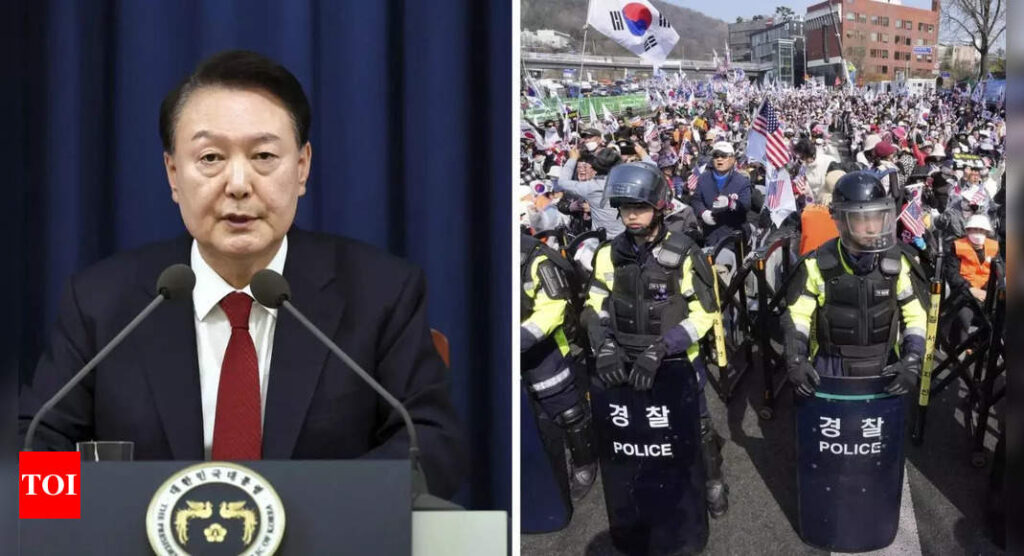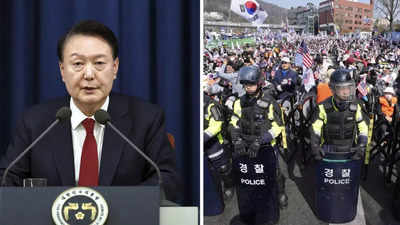South Korea’s Constitutional Court removed President Yoon Suk Yeol from office on Friday, four months after his failed attempt to declare martial law and deploy troops in Seoul.
The decision triggered fresh elections, marking a swift downfall for Yoon, who had risen to power just a year after entering politics.
Why was Yoon impeached and removed?
December 1 According to the criminal indictment, Yoon met with defence minister Kim Yong Hyun to discuss the National Assembly deadlock, where the opposition was using its majority to impeach officials and cut government budgets.
Prosecutors say Yoon had been advocating for “emergency measures” against liberals for months.
December 3 At 10.29 pm, Yoon announced martial law via television broadcast, labelling the National Assembly a “den of criminals” impeding governmental operations.
Yoon pledged to “eradicate” his opponents, labelling them as North Korea-sympathising “anti-state forces” and “the main culprits of our nation’s downfall” without providing substantiating evidence.
The martial law command issued extensive governmental powers, including restrictions on political activities and media control. The decree permitted warrantless arrests for violations.
Armed forces surrounded the Assembly to prevent legislative voting on the martial law declaration. Opposition Democratic Party leader Lee Jae-myung broadcast his journey live, encouraging public support at parliament. He accessed the grounds by climbing a fence.
December 4 After midnight, Assembly Speaker Woo Won Shik announced on YouTube that they would address Yoon’s declaration through “constitutional procedure.”
Woo reached the main chamber at 12:35 am, whilst troops breached windows but failed to access it. At 12.4 am, Woo initiated voting to revoke martial law, the Associated Press reported.
Around 1.00 am, 190 legislators, including 18 from Yoon’s People Power Party, unanimously voted to end martial law. Security forces withdrew afterwards. At 4.03 am, following a Cabinet meeting, martial law was officially terminated.
December 5 Yoon dismissed Defence Minister Kim Yong Hyun. Han Dong-hun, Yoon’s party leader, initially opposed the impeachment despite criticising martial law as “unconstitutional.”
December 6 Han altered his stance, supporting the suspension of Yoon’s powers, citing risks of further martial law attempts.
December 7 Yoon apologised and accepted responsibility. He survived an impeachment vote that most ruling party members boycotted.
December 8 Prosecutors detained former defence minister Kim regarding martial law implementation.
December 9 The Justice Ministry restricted Yoon’s international travel amid expanded investigations.
December 10 Army Special Warfare Commander Kwak Jong-keun revealed receiving instructions from the former defence minister to prevent lawmakers from entering the chamber.
Kwak revealed that Yoon personally called him, instructing troops to “quickly break down the door and remove the lawmakers inside.” However, Kwak stated that he did not follow the order.
December 11 Kim, the former defence minister, faces formal arrest regarding alleged collaboration with Yoon and others in martial law implementation.
South Korean law enforcement’s attempt to investigate Yoon’s office is prevented by his security personnel. Police take into custody both the national police chief and Seoul’s senior police officer for their involvement in executing Yoon’s martial law directives.
December 12 Yoon maintains his martial law declaration was a legitimate governmental action, rejects rebellion accusations, and pledges continued resistance against impeachment efforts.
The National Assembly approves measures to impeach national police chief Cho Ji Ho and Justice Minister Park Sung Jae, halting their official functions due to their suspected involvement in martial law enforcement.
December 14 The National Assembly votes 204-85 to impeach Yoon. His presidential authority is suspended, with Prime Minister Han Duck-soo assuming leadership.
December 27 The National Assembly votes to remove Han as acting president due to his failure to address Constitutional Court vacancies.
December 31 A detention warrant for Yoon’s questioning is issued by the Seoul Western District Court.
Also read – ‘I am truly sorry’: South Korea’s Yoon after being removed from office
January 3 Security forces and barriers prevent investigators from accessing the presidential residence to detain Yoon.
January 7 Park Jong-joon steps down as presidential security service chief.
January 14 The Constitutional Court conducts its inaugural hearing regarding Yoon’s impeachment, lasting briefly as Yoon opts not to attend.
January 15 Law enforcement officials and anti-corruption units execute a search at the presidential premises and take Yoon into custody, marking the first instance of a sitting president’s detention.
January 19 Following concerns about potential evidence tampering, the Seoul Western District Court approves a formal arrest warrant for Yoon. His supporters respond with violence, storming the court premises, causing damage to windows and equipment. Authorities arrest nearly 90 participants.
January 26 The Seoul Central District Prosecutors’ Office files charges against Yoon for allegedly orchestrating an attempted rebellion, accusing him of unlawfully attempting to take control of the legislature and election offices whilst planning to arrest his political rivals.
March 7 Citing procedural concerns regarding investigative authority, the Seoul Central District Court orders Yoon’s release from detention. His release occurs the next day.
March 24 Prime Minister Han’s impeachment is reversed by the Constitutional Court, reinstating his authority as acting leader.
April 4 The Constitutional Court validates Yoon’s impeachment and terminates his presidency, forcing an election to select his replacement.
What will happen next?
Following Friday’s unanimous ruling, South Korea must conduct a presidential election within two months, setting the stage for what could be one of the nation’s most contentious electoral contests.
Yoon confronts serious legal challenges, including a rebellion trial where potential sentences range from death to life imprisonment.
The electoral authorities are expected to announce the precise date shortly, with local media suggesting the first week of June as the likely timeframe for the presidential poll, which must occur within a 60-day window.
This special election differs from standard presidential polls in that the victor will assume office immediately the day after winning, rather than having the customary two-month transition period.
Currently, Prime Minister Han Duck-soo serves as acting president, having returned to his duties following the Constitutional Court’s dismissal of his impeachment case last week.


